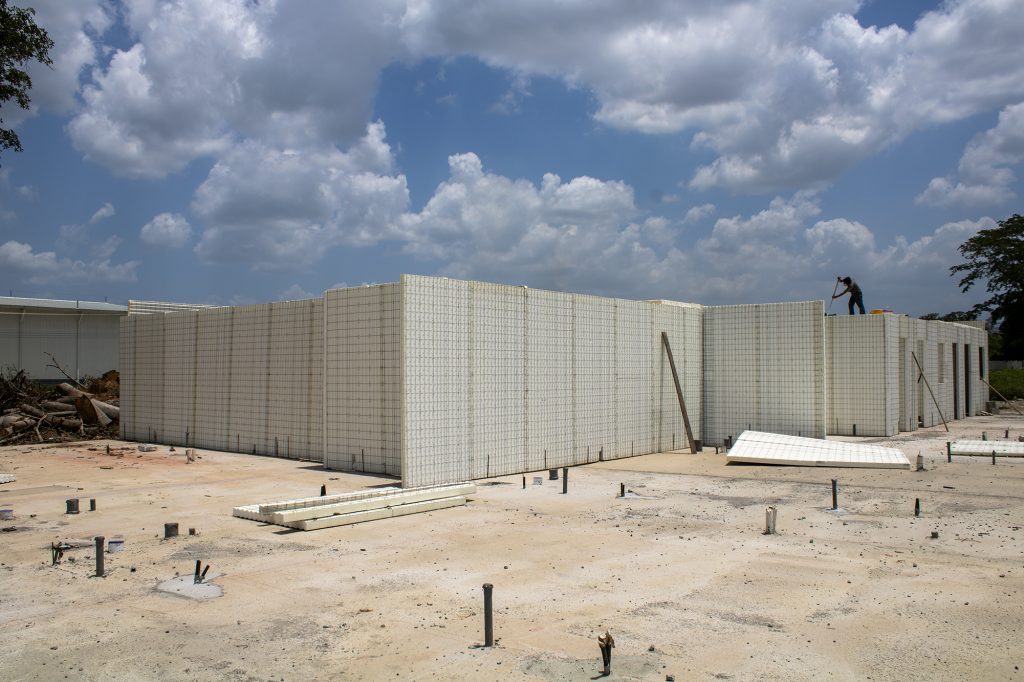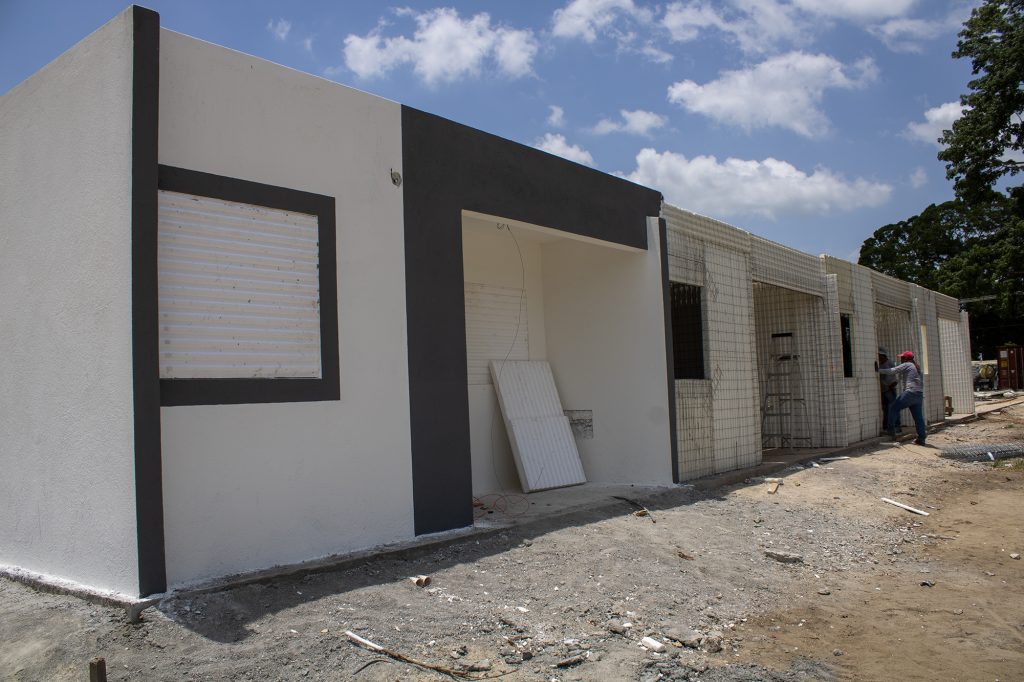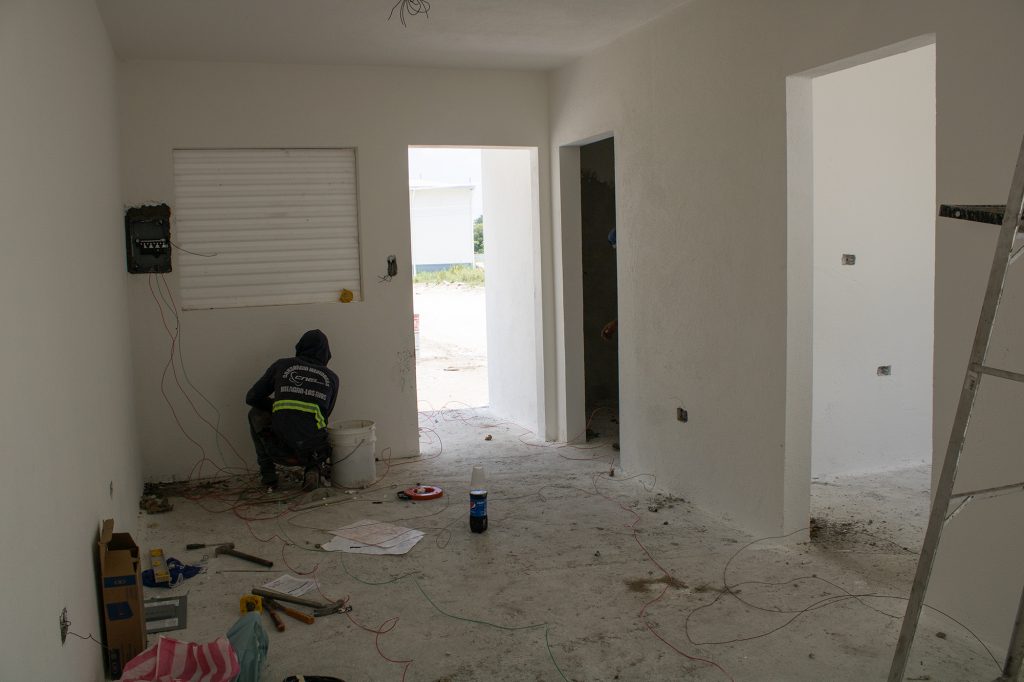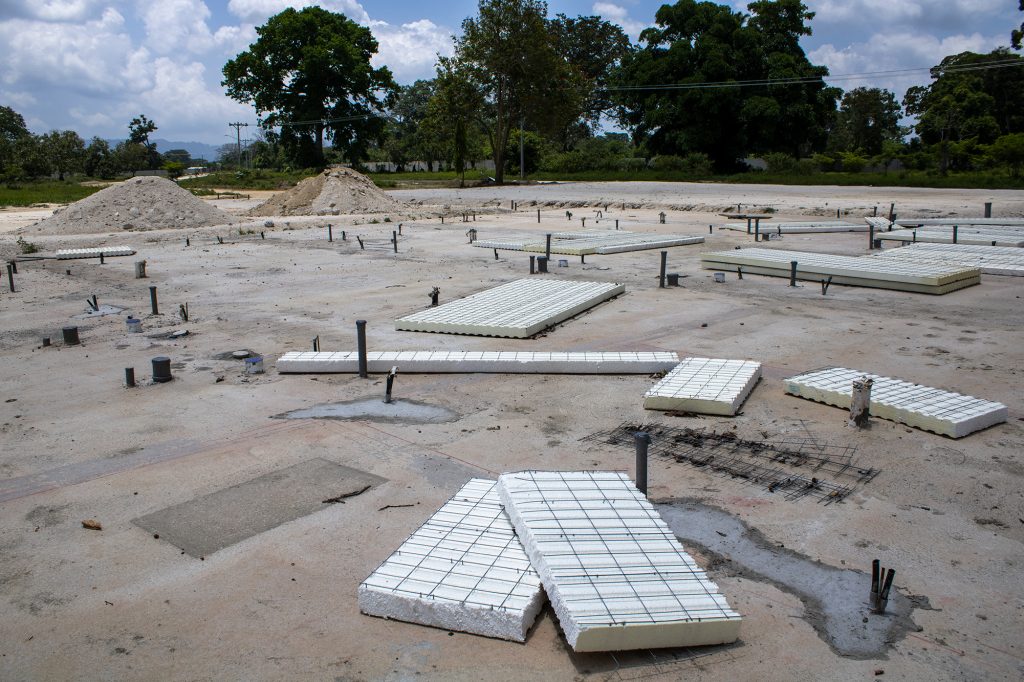While Hondurans continue to battle the pandemic and await the arrival of COVID-19 vaccines, Employment and Economic Development Zones (ZEDEs) are being built in Roatán and Choloma, with La Ceiba coming soon as well.
By Lizz Raudales
Photos by Lizz Raudales
The municipality of Choloma has the most foreign-owned factories in Honduras and has one of the highest levels of economic activity in the country. Choloma’s ZIP designation as a free industrial zone (Zona Industriales Libres – ZIP) enables it to offer attractive tax benefits for this type of industry. Now, in addition to the ZIP designation, the build-out of the first Employment and Economic Development Zone (Zona de Empleo y Desarrollo Económico – ZEDE) in Choloma is underway.
The ZEDE project, called Morazán City, is located in Choloma’s Caraos community. The project investors plan to build both an industrial and a residential zone. So far, warehouses have been erected and the residential complex is being developed. According to the project website, the residential units will be townhouses that will rent for approximately US$125 per month, and studio apartments that will rent for approximately US$83 per month. A four-story building will house 70 of these apartments, as well as some commercial units.
Massimo Mazzone, an Italian businessperson based in Honduras, is the developer of Morazán City. In an interview with Contracorriente, he said that he has been interested in building a charter city like this since 2012, when US economist Paul Romer first proposed this model for expanding socioeconomic development in the host countries. Mazzone said that Morazán City does not plan to sell real estate, but will instead rent residences and commercial properties to individuals and businesses that want to locate there.
But even though the developers of ZEDEs in Honduras cite Paul Romer’s model as the theoretical foundation for their projects, Romer has repeatedly said that the Honduran ZEDEs deviate significantly from his model and that he does not endorse them. Interviewed in 2017 for an El Faro article on Honduran ZEDEs, Romer said, “I have distanced myself from the project [in Honduras], because the last time I checked, it was going in a direction that I do not support. Specifically, I’m afraid that it could be used in an unacceptable manner, as it could provide a means for a small group of people with access to power in Honduras to distort democratic voices indefinitely.”
Some Twitter users have been interacting recently with Romer, who has said that he withdrew from the projects in Honduras due to a lack of transparency. “I have repeatedly criticized the current ZEDE model, which was introduced long after I cut all my ties to the government in Honduras. Unfortunately, there is an infinite supply of lies, including the lie that I back the current system and projects,” tweeted Romer.
I've repeatedly criticized current ZEDE model, which was introduced long after I cut all my ties to the government in Honduras.
— Paul Romer (@paulmromer) May 28, 2021
Unfortunately, there is an infinite supply of lies, including the lie that I back the current system and projects.
Contracorriente was able to tour the area where Morazán City is being built. The construction site has an area of 24 hectares (approximately 59 acres). Four warehouses of 100 square meters each have been built and have been rented to tenants since the end of January. According to Diego Zúniga, a Morazán City employee, there are plans to build between 17 and 20 warehouses for industrial storage. The main street is 700 meters long and will be connected to secondary streets leading to the residential, commercial and industrial areas. Zúniga says that the main street will have a cycling lane in the middle instead of a median strip. The support structures for the water storage tanks are already in place. Every residential building will have a direct line to one of these tanks.
According to the Morazán City website, the first 100 housing units were expected to be ready in June, but bad weather has delayed completion
When asked when the ZEDE will begin operations, the project manager said that the first block of 16 townhouses (eight townhouses on each side) will be finished in July and ready for occupation. The townhouses are 2 bedroom/1bathroom units with a living/dining area, kitchen, and a patio with an outdoor sink and washing machine connections. Mazzone says that all of the residential units will have drinkable water from the tap, the first residential development in Honduras with this amenity. They will also have electricity and air conditioning, due to Choloma’s hot and humid climate.
Zúniga noted that they are using building materials and technologies not commonly seen in Honduras. For example, polystyrene panels with stucco exteriors are being used for the walls. The installation process is less time-consuming and the insulating properties of the polystyrene will preserve the air conditioning better. The housing project began in April with soil remediation since the area’s sandy soil is not suitable for building construction.
According to Mazzone and Zúniga, some people from the surrounding areas have already expressed interest in moving into one of the Morazán City residences. Mazzone mentioned Doña Rosa, a woman who started off selling soft drinks and candy to construction workers at the ZEDE site, and now rents a small space in Morazán City for US$10 per month. She is the first person to set up a business in the model city.
In our interview with Massimo Mazzone (project owner) and Carlos Fortín Lardizábal (Technical Secretary of the ZEDE), Fortin said they have held regular meetings of the Committee for the Adoption of Best Practices (CAMP). This ZEDE governance body is normally composed of five Honduran nationals, but only the following four have met with him: Octavio Sánchez, Ebal Díaz Lupián, Arnaldo Castillo and Carlos Pineda Pinel.
While there has been some interest in the industrial facilities, problems with customs and export mechanisms have prevented the project authorities from finalizing contracts. The industrial tenants must be “fresh investments,” meaning existing companies cannot set up operations in a ZEDE; new legal entities must be established.
Their vision for Morazán City is to improve the living conditions of working class residents of Choloma by addressing all of their socioeconomic problems, including crime rates and living conditions. Their target population is mostly factory employees and single mothers.
Fortín said, “As a Honduran, my dream is that my compatriots, instead of leaving in a caravan to the United States, will line up to work and live in Morazán City or in other ZEDEs like this one. Our vision is to have many ZEDEs working like small development towns across the country. Our hope is that what we are building with a lot of passion in Choloma can be replicated around the country by others.”
To address the pervasive crime problem in Choloma, Fortín says Morazán City will have an internal police force and a wall will be built around the perimeter. They are also planning to develop an app with a panic button that residents of Morazán City can use to quickly report emergencies. Mazzone added that they will implement an educational plan that includes a bilingual school that will be more affordable than comparable private, bilingual schools in other Honduran cities.
Mazzone owns 3C Group, a holding company that includes Cadmus Academies, Farmacias del Ahorro and several real estate projects on the island of Roatan.
According to its website, the developer of Morazán City is a U.S. company called Overseas Real Estate LLC. The shareholders of this company are Massimo Mazzone and Guillermo Aguilar, the founders and leaders of Centro American Consulting & Capital (3C), a holding company that includes Farmacias del Ahorro and Proconsumo in Honduras, and Farma Value in the rest of the region.
Morazán City’s public registry indicates that seven companies have registered to operate in this ZEDE so far. These include Logística Integrada, a medical and pharmaceutical industry services company; Water and Electricity Company of Morazán City (Compañia Hídrica y Eléctrica de Ciudad Morazán), which will provide electricity and potable water to the ZEDE; and Global Protect Security, a security company.
Mazzone said, “Several city council members have opposed this project ⎻ one from the National Party, one from the Liberal Party, and one from the Libre Party. I took the opportunity to sit down and discuss the project with the National Party councilor, and then took her on a tour of the ZEDE. After learning all about it and seeing how low our rental prices will be, she asked us if she could live there herself. Of course, we said it would be our honor.”
Contracorriente spoke with Marta Pineda, a teacher and Choloma native, who said there is no opposition to this ZEDE like there is in Roatán. Pineda says there is little community opposition because, “60% of Choloma residents are people from other places and the other 40% aren’t interested in the issue.” As a teacher, she always teaches her students to love their native land, but projects like this will invalidate everything they are taught in school. It’s worth noting that residents of Roatán and La Ceiba are opposed to any project of this type anywhere in the country, not just in their own cities and neighborhoods.
Reforms to the ZEDE law
On May 10, the Executive Branch sent a bill to the National Congress that establishes a zero tax rate for ZEDEs, equivalent to an exemption from paying Honduran taxes. Draft bill #144-2021 authored by the Office of the President reforms aspects of the existing Law for the Implementation and Operation of the Employment and Economic Development Zones, specifically pertaining to the payment of taxes to the government of Honduras and domestic purchases by ZEDEs. A virtual session was held to approve this law, reforms to the Organic Law of the Employment and Economic Development Zones, and an interpretation of Article 6 of the Sales Tax Law. Article 6 states, “The general tax rate is 15% on the value of the taxable base of imports or the sale of goods and services subject to the tax.”
The proposed bill was presented by Ebal Díaz Lupián who, according La Gaceta (the official register of the Honduran government) is a CAMP member. It states, “A zero tax rate must be applied in the third paragraph of Article 32 of the Organic Law of the Employment and Economic Development Zones (ZEDE), which determines the taxes levied on the purchase or acquisition of inputs, goods or services in the domestic market that are incorporated or used in the production of goods or services exported from the Employment and Economic Development Zones (ZEDE), when the producer is also the exporter, or the good or service is produced or rendered by a third party that is an essential part of the value chain of the goods or services exported by the Employment and Economic Development Zones (ZEDE).”
“Honduras is Not for Sale”
The “Honduras Is Not for Sale” campaign was launched on May 18 to raise awareness among Hondurans to stop “the violation of human rights.” This public campaign was initiated in Roatán, where the Prosperous Honduras ZEDE is being developed.
Prosperous Honduras recently proposed incorporating the “Port of Satuye” in La Ceiba into its ZEDE. In addition, another Honduran ZEDE project called Mariposa (Butterfly) is being promoted by Daniel and Katerina Morin as “a startup city that will provide the highest quality of life through a polycentric system of governance. We chose to name our startup city Mariposa because a butterfly is a powerful symbol that represents endurance, change, hope, and life.” The website was created to attract future residents, investors, and team members to “our city near the Caribbean sea, with clean beaches.” While the specific location of this project was not revealed, the reference to the Caribbean has led some to believe that it will be built somewhere in the Bay Islands.
Recently there has been talk of another ZEDE in southern Honduras. Media reports indicate that it would be the largest agroindustrial park in Central America. This coincides with the recent creation of ZEDE Orquídea (Orchid), but its objective and location is still unknown. The registration documents reveal that the Technical Secretary of this project is Guillermo Peña Panting, who established the Eléutera Foundation, a non-profit organization based in San Pedro Sula. Peña is also the director of the system operator that ensures the security and continuity of the country’s electricity supply. This entity coordinates the generation and transmission system to ensure the efficiency of the Honduran electricity market as a whole. Contracorriente contacted Peña for an interview, but received no response.
“This law is a threat to citizen security, national sovereignty, the environment, our ecological development, and our natural resources. I think it is an insult to every Honduran, and specifically to Bay Islanders on this occasion,“ said Rosa Danelia Hendrix, president of the Federation of Bay Island Village Councils, at a press conference held in Tegucigalpa on May 20.
This initiative was launched to defend our human rights, national territory and environment. This campaign seeks to raise awareness of the unconstitutionality of the Organic Law of Employment and Economic Development Zones.
Oscar Hendrix, an attorney, believes that the process for creating and joining a ZEDE is an aberration and contravenes the requirements for the creation of a municipality. The requirements even contradict free trade zone regulations. “To create a new municipality, you need 40 kilometers of contiguous property. If land is to be separated from an existing municipality, then it must not endanger the population or negatively affect the existing municipality’s budget,” said Hendrix. He points out that the recent legislative reform equates a ZEDE to a municipality.
Hendrix also notes that free trade zones have a single specifically defined territory, unlike the ZEDEs, where parts of a municipality or department can join a ZEDE in a completely different area, thereby “slicing up the country.” By this, Hendrix is referring to the incorporation of the Port of Satuyé, which is located in La Ceiba, into the Prosperous Honduras ZEDE in Roatan. Hendrix compares the Port of Satuyé to the educational development project planned for the island of Santa Elena, off the coast of Roatan. Its planned incorporation into Prosperous Honduras never materialized.
Recommended listening (in Spanish):
“You can’t plant a garden in the middle of a horse paddock,” says Oscar Hendrix, about how the ZEDE idea is being sold abroad. “To the outside world, a ZEDE looks like a country within a country. But no one talks about how Honduras is a corrupt country, with no judicial independence, public officials linked to drug trafficking, and high levels of misery and poverty.”
As to the ZEDE laws, constitutional reforms, and other legal processes to approve this type of project, Hendrix says, “This is a libertarian’s dream. They can set up their own constituent assembly instead of reforming the existing government apparatus, instead of re-founding the state. They were given complete power to do whatever they want in their little niches.”
Mazzone would not comment much on the opposition to the ZEDEs and the questions about their constitutionality. “All I’m saying is that the Supreme Court, which I understand is the ultimate authority on the issue [of constitutionality], says that it’s not against the law.” The Italian businessperson says, “You can’t paint all the projects with the same brush, because the three approved ZEDEs are very different.” Putting the constitutionality issue aside, Mazzone says, “It’s normal for people to have different opinions about the value [to Honduras] of individual ZEDEs.”
Many experts claim that ZEDEs are unconstitutional, but the initiative has the backing of the country’s politicians, especially the governing National Party. This political support is one of the main concerns of the Honduran public, particularly citizens living in the north, the Caribbean coast and the Gulf of Fonseca, since these are the areas that the government has designated for ZEDEs, and which the investors see as paradise.










1 thought on “Corporate model cities in Honduras continue during an electoral year, pandemic”
I wish this idea will come to the USA in a near future. Minds like this are greatly needed here.